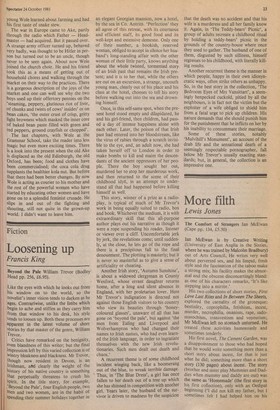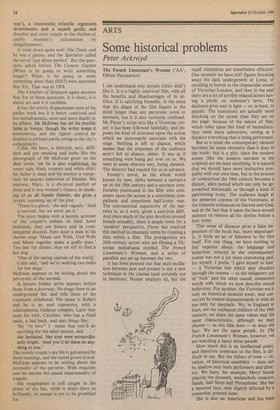More filth
Lewis Jones
The Comfort of Strangers Ian McEwan (Cape pp. 134, £5.50) Ian McEwan is by Creative Writing (University of East Anglia in the Sixties, where he was trained by Malcolm Bradbury) out of Arts Council, He writes very well about perverted sex, and his limpid, fresh style and the fascination of the taboo make a strong mix; his facility makes the abnormal and the obscene disconcertingly bland: as one of his characters remarks, 'It's like stepping into a mirror.'
His two collections of short stories, First Love Last Rites and In Between The Sheets, explored the carnality of the grotesque: bestiality, coprophilia, fetishism, incest, murder, necrophilia, onanism, rape, sadomasochism, transvestism and voyeurism; Mr McEwan left no stomach unturned. He treated these activities humorously and sometimes tenderly.
His first novel, The Cement Garden, was a disappointment to those who had hoped that he would write something more than a short story about incest, for that is just what he did; something more than a short story (130 pages) about incest. The story (brother and sister play Mummies and Daddies when mummy and daddy are out) was the same as 'Homemade' (the first story in his first collection), only with an Oedipal beginning (1 did not kill my father, but I sometimes felt I had helped him on his way'), a transvestite infantile regression divertimento and a superb gothic end (brother and sister couple to the rhythm of smelly mummy's exhumation by sledgehammer).
It went down quite well: The Times said he was a genius, and the Spectator called the novel 'just about perfect'. But the questions asked before The Cement Garden (When is he going to write something longer? When is he going to write something other than filth?) were answered Not Yet. That was in 1978.
The Comfort of Strangers again answers Not Yet to those questions. It is short, it is about sex and it is excellent.
It has the utterly dispassionate tone of his earlier work but it is better contrived and less melodramatic, surer and more deadly in its effects. Mr McEwan has set his psychic fable in Venice, though the writer keeps it anonymous, and the tighter control he displays is perhaps partly owing to the city's unfamiliarity.
Colin, the hero, is thirtyish, arty, diffident and pot smoking and looks like the photograph of Mr McEwan given on the dust cover, yet he is also traditional; he wears tight black trousers and white shirt; his father is dead and his mother is remarried: he smacks somewhat of Hamlet. His mistress, Mary, is a divorced mother of three and is into women's theatre; in speaking of an all female Hamlet, she gives a cryptic summing up of the plot: 'There is a ghost,' she said vaguely. 'And a convent, but we never see it.'
The story begins with a laconic account of the couple's tedium in their hotel bedroom; they are listless and in eventempered discord. Next door a man in his shower sings 'Mann und Weib, Und Weib und Mann together make a godly span.' Too late for dinner, they set off to find a hot dog.
'One of the eating capitals of the world,' Colin said, 'and we're walking two miles for hot dogs.'
McEwan appears to be writing about the perversity of the normal.
A hirsute Italian sprite appears before them from a doorway. He drags them to an underground bar and tells them of his traumatic childhood. His name is Robert and he is an anal repressive, with a schizophrenic Oedipus complex. Later they meet his wife, Caroline, who has a fixed smile, a bad back, and says things like: 'By "in love" 1 mean that you'd do anything for the other person, and .
she hesitated. Her eyes were extraordinarily bright. 'And you'd let them do anything to you.'
The trendy couple's sex life is galvanised by these meetings, and the mood grows lyrical. McEwan appears to be writing about the normality of the perverse. With exquisite care he catches the casual impersonality of tragedy.
His imagination is still caught in the prism of sex but, while it plays there so brilliantly, its escape is not to be grumbled for.



































 Previous page
Previous page